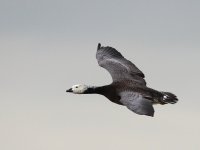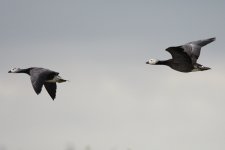-
Welcome to BirdForum, the internet's largest birding community with thousands of members from all over the world. The forums are dedicated to wild birds, birding, binoculars and equipment and all that goes with it.
Please register for an account to take part in the discussions in the forum, post your pictures in the gallery and more.
You are using an out of date browser. It may not display this or other websites correctly.
You should upgrade or use an alternative browser.
You should upgrade or use an alternative browser.
Pair of geese over Dungeness today (1 Viewer)
- Thread starter Barry Boswell
- Start date
More options
Who Replied?
Maybe this thread will be useful:
http://www.birdforum.net/showthread.php?t=140481
http://www.birdforum.net/showthread.php?t=140481
timwootton
Well-known member
Curious there should be 'a pair' of them (ie 2) but then again, they could be siblings and have stayed together since hatching - or they could be from a domestic hybridisation - in which case, look out for some more.
ColonelBlimp
What time is bird?
timwootton said:they could be siblings and have stayed together since hatching
There are a pair of white-fronted x canada geese that tend to circuit around my local reservoirs, and since they've never bred to my knowledge I'm betting that they are siblings as well.
Joern Lehmhus
Well-known member
These are typical hybrids Barnacle goose x Emperor goose,
compare:
http://www.flickr.com/photos/14195020@N08/3208841459/
http://waarneming.nl/foto/view/679482
http://waarneming.nl/foto/view/634347
compare:
http://www.flickr.com/photos/14195020@N08/3208841459/
http://waarneming.nl/foto/view/679482
http://waarneming.nl/foto/view/634347
Last edited:
Alan Tilmouth
Well-known member
not barnacle - some sort of nasty hybrid!
Tricky perhaps James but never Nasty.
I am not sure can agree with the statement , “tricky but not nasty “. Nasty in deed they are. If such escaped hybrids were fertile we could be at risk of losing pure barnacle geese. That might sound a bit extreme , but it has happened in wild populations of waterfowl. It is thought that less than 15% of the New Zealand grey duck are now genetically pure with the majority of the population being Mallard X New Zealand grey duck.
Its important that such hybrid individuals are removed from the wild before they start to breed.
Its important that such hybrid individuals are removed from the wild before they start to breed.
Hotspur
James Spencer

I am not sure can agree with the statement , “tricky but not nasty “. Nasty in deed they are. If such escaped hybrids were fertile we could be at risk of losing pure barnacle geese. That might sound a bit extreme , but it has happened in wild populations of waterfowl. It is thought that less than 15% of the New Zealand grey duck are now genetically pure with the majority of the population being Mallard X New Zealand grey duck.
Its important that such hybrid individuals are removed from the wild before they start to breed.
Not so, fertile hybrids are not likely to prove a threat to an abundent and spreading species with multiple populations. First the hybrids have to prove more arractive to barnacles than pure birds and secondly the hybrids have to reach the breeding grounds in novlya zemla and franz josef land etc. Thirdly the hybrids would have to be better parents than barnacles. All seems pretty unlikely. The New Zealand duck is range restricted and sedentary so the weight of numbers and lack of migration make fertile hybrids a risk. Good science is needed not knee jerk reactions. Control of birds should be well justified. Hybrids occur widely throughout the anatidae but relatively few cause problems especially when they are cross genus as in this case. As for nasty - purely horrible looking was my inference.
Alan Tilmouth
Well-known member
I intepreted James comment as a reference to looks rather than behaviour and my comment was in reference to this. Purely from an ID perspective hybrids provide us with a challenge that pure species often can't.
Joern Lehmhus
Well-known member
Well, i am not very worried about these (anser x branta seem to be mostly infertile , and cases where the hybrids may have been fertile seem rare)
and many other waterfowl hybrids here, (also not about the introduced species)
-the exception being the situation ruddy duck-whiteheaded duck and the question how much interspecific concurrence may be between canada and greylag especially in Scandinavia-
-and nowadays the situation between Branta hutchinsi , leucopsis and canadensis in middle europe- there are qute some hybrids in the netherlands, for example-but mainly from local or at least middle european populations?
and many other waterfowl hybrids here, (also not about the introduced species)
-the exception being the situation ruddy duck-whiteheaded duck and the question how much interspecific concurrence may be between canada and greylag especially in Scandinavia-
-and nowadays the situation between Branta hutchinsi , leucopsis and canadensis in middle europe- there are qute some hybrids in the netherlands, for example-but mainly from local or at least middle european populations?
peterarras
Well-known member
Hi,
I love Waterfowl very much, more than 30 year's, I follow the situation with the hybridisation. It's a disaster, far from any Park's or Collection's you can see hybrid's in many form's and colour's, I'm really worried, what is comming in the future.
A good example is "Bird Forum ID", I think more than half of all Thread's are about those ugly hybrid's (I never saw any beautiful bird).
An other example is the situation of the Greylag Goose in West Gerany (I think not only there), a lot of population's are from hybrid's with domestic Geese (Duemmer See, Odenwald, Niederrhein and perhaps more), I don't no how to safe these problems.
Sorry for my pure english knolege, it's very difficult to explain my whole thoughts about these problems.
Cheers
Peter.
I love Waterfowl very much, more than 30 year's, I follow the situation with the hybridisation. It's a disaster, far from any Park's or Collection's you can see hybrid's in many form's and colour's, I'm really worried, what is comming in the future.
A good example is "Bird Forum ID", I think more than half of all Thread's are about those ugly hybrid's (I never saw any beautiful bird).
An other example is the situation of the Greylag Goose in West Gerany (I think not only there), a lot of population's are from hybrid's with domestic Geese (Duemmer See, Odenwald, Niederrhein and perhaps more), I don't no how to safe these problems.
Sorry for my pure english knolege, it's very difficult to explain my whole thoughts about these problems.
Cheers
Peter.
bitterntwisted
Graham Howard Shortt
those ugly hybrid's (I never saw any beautiful bird)
These are gorgeous!... http://www.bobsteelephoto.com/Species/mall_nopi.html
I am very surprised you seem to show so little concern Hotspur about the risk of hybridisation between waterfowl. Even the slightest risk should not be taken with crossbreds. Its true genetic swamping is unlikely with birds with large populations , but not impossible. There are a number of island forms of mallard in the Pacific area under threat from mallard , true most with small populations , but that is not true with the New Zealand grey duck which was described as very abundant 100 years ago , but now pure specimens are very uncommon. Even water birds with large populations are under threat such as the North American black duck which is declining as the mallard genetically swamps it with their western range spread.
Quote apart from genetic swamping if a hybrid population spreads it comes into competition with native species for food and nest sites . Man is releasing a wide range of species that would never normally meet naturally and a few are now producing hybrids and while the problem is likely to be small most of the time there is always the threat there. As wild places decline under the march of human expansion these threats are going to increase. Is it really worth the risk to leave hybrid birds at large .
Quote apart from genetic swamping if a hybrid population spreads it comes into competition with native species for food and nest sites . Man is releasing a wide range of species that would never normally meet naturally and a few are now producing hybrids and while the problem is likely to be small most of the time there is always the threat there. As wild places decline under the march of human expansion these threats are going to increase. Is it really worth the risk to leave hybrid birds at large .
Last edited:
Users who are viewing this thread
Total: 2 (members: 0, guests: 2)





